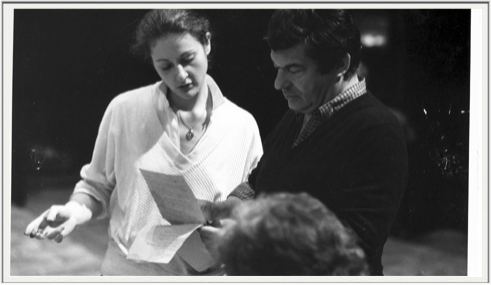



Jean-Pierre Ponnelle 1932-1988
A nod to the master
Putting this website together caused much reflection and made me look at who I am today, more than thirty years after this fateful encounter in the Munich Opera House which lead to often unparalleled, exhilarating, difficult, and wonderful years.
Ponnelle touched people. Whether they liked him or not, nobody who met him remained untouched. Being a stage director, set designer, costume designer, and lighting designer, he touched all the professionals everywhere he worked. Equally strong he touched the singers he worked with, the soloists and choruses, the conductors, the administrative staff of opera houses, the audiences, and the critics, and not to forget, other stage directors. Opera through him was modernized, and after him was never the same again. He saw opera as emotion and drama, not as stand-and-sing spectacle, and sometimes fought hard with singers and conductors to achieve the emotional expression and dramatic interpretation he saw in the score. At the same time his sense of humour and knowledge of commedia created the fertile ground for the revival of Rossini operas. For many years only Il Barbiere di Siviglia had been regarded as a worthwhile piece to perform - Ponnelle convinced the opera world otherwise with his beautiful, funny, and touching productions of La Cenerentola, Il Turco in Italia, L’Italiana in Algeri, Le Comte Ory, Il Signor Bruschino, a.o.
His greatest love, though, was Mozart. Long before the “Mozart effect” he recognized the value and depth of his music, and often fought with conductors to open “traditional cuts” as he realized their dramatic sense and reason where conductors did not. La Clemenza di Tito in Munich was a revelation for many and lead to the long overdue revival of the early Mozart operas at many opera houses. And it was this production in Munich that touched me, or better, completely turned my world upside down, opening my eyes to something so unique and beautiful and heart-wrenching, that it made me want to be part of “this”.
A few years later I became his assistant and the life of work and little sleep began. At that time there were three other assistants he also worked with, but two of them, Grischa Asagaroff and Jutta Gleue, were working full-time at opera houses and therefore could not simply leave, and a third one, Nicolas Joel, had just started his career as director and opera administrator. I was free-lance and could travel, and travel I did. As assistant you were expected to know about all of Ponnelle’s work areas - directing, set design, costume design, and lighting - and if you didn’t you better learned about them really fast, otherwise you would not last with him. Furthermore his intellectual brilliance and phenomenal education and knowledge made him draw from all the arts, the visual arts, architecture, theatre, film, and literature, with his endless curiosity always adding new knowledge and creating new images and expressions onstage.
One of the things I took away from the time with him is his belief that we in the musical arts have to be good enough for the music. We have to grow to fit the greatness of the music, and not make the music smaller, to fit our little comfort zone.
Only then can we even begin to talk about art.
WORKS WITH & FOR JEAN-PIERRE PONNELLE
1978 Work on Lear (by A. Reimann) at Munich SO (1978) resulted in a long-term association with Ponnelle:
Carmen San Francisco, Zurich, Cologne, Chicago, Tel Aviv
Madama Butterfly Strasbourg, Cologne
Parsifal Cologne, Barcelona
Idomeneo New York MET, Salzburg
Manon Vienna SO, New York MET, Munich SO
Fidelio Berlin
Cavalleria / Pagliacci San Francisco, Vienna SO
Arlecchino (Busoni) / Pagliacci Houston
Falstaff San Francisco, Chicago
Troades (by Reimann) Munich SO
Flying Dutchman San Francisco, Chicago
Marriage of Figaro Salzburg
Tosca Montpellier
